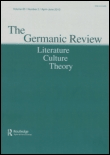
GERMANIC REVIEW
Scope & Guideline
Exploring the Depths of Germanic Cultures
Introduction
Aims and Scopes
- Interdisciplinary Approaches to German Studies:
The journal incorporates various disciplinary perspectives, including literary studies, philosophy, sociology, and cultural studies, to provide a holistic understanding of German literature and its contexts. - Focus on Theatrical and Dramatic Literature:
A significant portion of the journal's publications centers on dramatic works, exploring themes of entrance, representation, and the dynamics of performance in both historical and modern contexts. - Engagement with Historical Contexts and Theories:
The GERMANIC REVIEW examines the historical underpinnings of literary works, addressing socio-political issues, trauma, and philosophical inquiries that shaped German literature from the past to the present. - Exploration of Modernism and Contemporary Literature:
The journal highlights modernist texts and contemporary literary voices, especially those that engage with issues of identity, migration, and cultural hybridity, reflecting current societal challenges. - Critical Analysis of Canon Formation and Appropriation:
There is a consistent focus on the mechanisms of canon formation in German literature, investigating the role of cultural appropriation and the voices of marginalized groups.
Trending and Emerging
- Intercultural and Transnational Perspectives:
There is an increasing emphasis on intercultural exchanges and the transnational dimensions of German literature, particularly in the context of migration and globalization. - Exploration of Trauma and Memory:
Recent publications have highlighted themes of trauma, memory, and the impact of historical events on contemporary literature, showcasing how these experiences shape narratives and identities. - Queer Theory and Gender Studies:
The journal has expanded its scope to include queer theory and gender studies, reflecting a growing interest in diverse identities and the representation of marginalized voices in German literature. - Environmental Literature and Ecocriticism:
Emerging themes related to ecocriticism and environmental concerns are increasingly present, addressing the intersections of literature, ecology, and climate change. - Digital Humanities and New Media:
There is a notable trend towards exploring the impact of digital media on literature, including analyses of how contemporary texts engage with digital culture and technology.
Declining or Waning
- Traditional Historical Narratives:
There is a noticeable decline in papers that adhere strictly to traditional historical narratives of German literature, as the journal increasingly favors interdisciplinary and contemporary approaches. - Regional Studies with Limited Scope:
Publications focusing exclusively on specific regional literatures within the German-speaking world have decreased, indicating a shift towards more global and transnational perspectives. - Exclusively Theoretical Papers:
The journal has seen a reduction in purely theoretical papers that do not engage with practical or textual analysis, as there is a growing preference for works that connect theory with tangible literary examples.
Similar Journals

ANALES DE LA LITERATURA ESPANOLA CONTEMPORANEA
Elevating Understanding of Contemporary Literary TheoriesANALES DE LA LITERATURA ESPANOLA CONTEMPORANEA is a distinguished journal published by the TEMPLE UNIVERSITY, DEPARTMENT OF SPANISH & PORTUGUESE, specializing in contemporary Spanish literature. With an ISSN of 0272-1635, this journal has carved its niche within the field, offering a platform for innovative research and discourse from 2002 to 2012 and resuming its publication from 2017 to 2024. Although it currently holds a Q4 category ranking in Literature and Literary Theory, this journal is committed to promoting high-quality scholarship, making valuable contributions to the understanding of modern literary trends and theories. Despite limited open-access options, the journal prides itself on its rigorous editorial standards and aims to engage researchers, students, and literary professionals in meaningful discussions surrounding contemporary Spanish literature. Its *Scopus ranking*, positioned at #739 out of 1106 in the Arts and Humanities category, highlights its relevance and emerging recognition within the academic community.

Eixo e a Roda-Revista de Literatura Brasileira
Illuminating the Rich Tapestry of Brazilian CultureEixo e a Roda-Revista de Literatura Brasileira is a pioneering academic journal dedicated to the exploration and dissemination of Brazilian literature, published by the Federal University of Minas Gerais, Faculty of Letters. Since its inception in 1982, this Open Access journal has provided a vital platform for researchers, educators, and enthusiasts to share innovative ideas and critical analyses related to Brazilian literary studies. With its ISSN 0102-4809 and E-ISSN 2358-9787, the journal attracts a diverse readership and invites submissions that contribute to the richness of Brazilian cultural discourse. Located in Belo Horizonte, Brazil, the journal plays a critical role in advancing scholarly dialogue and promoting accessibility in literature research, fostering an inclusive environment for academic exchange.

Literary Voice
Illuminating the Multifaceted Nature of Literary StudiesLiterary Voice is a pioneering journal dedicated to the exploration and critique of literature and its multifaceted dimensions. Established in Punjab, India, and published by LITERARY VOICE, this journal aims to serve as a vital platform for scholars, researchers, and enthusiasts in the field of literary studies. With its ISSN 2277-4521 and E-ISSN 2583-8199, Literary Voice strives to foster intellectual discourse and encourage innovative scholarship through diverse thematic issues. While currently operating without an open access model, the journal provides a crucial space for the dissemination of original research and critical analysis that contribute to the enrichment of literary understanding. As an emerging publication in the humanities, Literary Voice invites submissions from across the globe, making it an essential resource for those looking to engage with contemporary literary debates and foster cross-cultural dialogues.
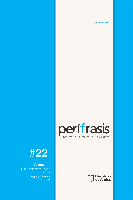
Perifrasis-Revista de Literatura Teoria y Critica
Exploring the intersections of literature and identity.Perifrasis-Revista de Literatura Teoria y Critica is a distinguished open-access journal published by UNIV ANDES in Colombia, dedicated to advancing the fields of literature, literary theory, and criticism. With an ISSN of 2145-8987 and an E-ISSN of 2145-9045, this journal has been a significant platform for scholarly discourse since its inception in 2010, embracing an open-access model that enhances accessibility and dissemination of research findings. Strategically positioned in the Q2 category for Literature and Literary Theory, Perifrasis boasts a commendable Scopus ranking, reflecting its commitment to high-quality scholarship. The journal encompasses a wide range of topics within the humanities, including cultural studies and gender studies, and aims to foster critical engagement and innovative thinking among researchers, students, and professionals alike. As the journal continues to evolve through its converged years from 2019 to 2024, it remains a vital resource for those exploring the dynamic intersections of literature, society, and identity.
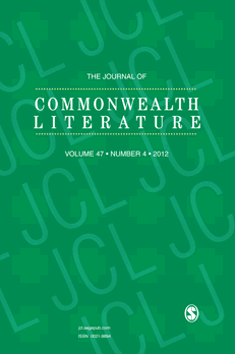
JOURNAL OF COMMONWEALTH LITERATURE
Advancing Scholarly Discourse in Literary TheoryJOURNAL OF COMMONWEALTH LITERATURE, published by SAGE Publications Ltd, serves as a premier platform for scholarly discourse in the field of Literature and Literary Theory. Established in 1966, this esteemed journal has built a robust reputation, as evidenced by its impressive Q1 ranking in the 2023 category of Literature and Literary Theory and its placement in the impressive 91st percentile among its peers in the Scopus rankings. With an ISSN of 0021-9894 and an E-ISSN of 1741-6442, the journal provides valuable insights into the rich tapestry of Commonwealth literature, exploring diverse works and critical theories that shape our understanding of literature outside the conventional Western canon. While currently not designated as an Open Access journal, it continues to attract a global readership seeking to advance knowledge in this vital area of scholarship. Researchers, professionals, and students alike will find in its pages a rich resource for innovative ideas and critical discussions that reflect the evolving landscape of literary studies.
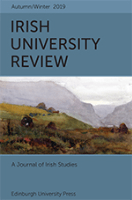
IRISH UNIVERSITY REVIEW
Nurturing Academic Excellence in Literary Theory and CriticismIRISH UNIVERSITY REVIEW is a distinguished academic journal published by Edinburgh University Press, specializing in the fields of Literature and Literary Theory. With an ISSN of 0021-1427 and an E-ISSN of 2047-2153, this journal serves as a vital platform for scholarly discourse on contemporary and historical literary studies related to Ireland and its cultural contexts. Located in the United Kingdom, the journal has achieved an impressive Q2 ranking in the 2023 category of Literature and Literary Theory, placing it in the 81st percentile among peer-reviewed arts and humanities journals globally, as per Scopus rankings. IRISH UNIVERSITY REVIEW is committed to fostering academic excellence and offers a range of access options for its readers, promoting both traditional and digital scholarship. With a publication timeline extending from 2002 to 2024, the journal is dedicated to enhancing understanding and appreciation of Irish literature through critical essays, reviews, and innovative research, making it an essential resource for researchers, professionals, and students alike.
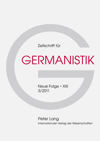
ZEITSCHRIFT FUR GERMANISTIK
Navigating the Evolving Landscapes of German LiteratureZEITSCHRIFT FUR GERMANISTIK, published by PETER LANG GMBH, is a distinguished academic journal that serves as a vital resource in the fields of German studies, literature, linguistics, and cultural analysis. With an ISSN of 0323-7982, this journal provides critical insights and promotes scholarly discourse surrounding the evolving landscapes of German language and literature. Although it operates under a traditional access model, readers and researchers benefit from its rigorous peer-reviewed articles that span decades of intellectual inquiry. Historically featured in Scopus, the journal is noted for its impactful contributions, ranking 244th in Literature and Literary Theory and 406th in Linguistics and Language, highlighting its importance in the academic community. Situated in Bern, Switzerland, ZEITSCHRIFT FUR GERMANISTIK not only caters to scholars seeking to enrich their understanding of Germanic studies but also aims to bridge gaps across interdisciplinary borders, fostering a deeper appreciation of the cultural narratives that shape our world.

LINKS Rivista di letteratura e cultura tedesca
Illuminating the Rich Tapestry of German Cultural HeritageLINKS Rivista di letteratura e cultura tedesca is a distinguished academic journal dedicated to the exploration and analysis of German literature and culture. Published by FABRIZIO SERRA EDITORE, this journal serves as a vital platform for researchers, professionals, and students who wish to delve into the intricacies of German cultural studies across various time periods and genres. With both ISSN 1594-5359 and E-ISSN 1724-1685, LINKS emphasizes scholarly rigor and multidisciplinary approaches, providing a space for innovative research and critical perspectives. Although the journal is not open access, it still plays a crucial role in advancing the understanding of German literature within the international academic community, contributing significantly to the field's ongoing dialogue and evolution. For those interested in enhancing their knowledge and engagement with contemporary issues in German studies, LINKS represents an essential resource.

Teksty Drugie
Cultivating Insightful Dialogue in Literary ScholarshipTeksty Drugie is a premier academic journal dedicated to the field of Literature and Literary Theory, published by the Polish Academy of Sciences, Institute of Literary Research. With its issuance beginning in 2008 and extending intermittently to 2020, this journal has been a significant contributor to literary scholarship in Poland and beyond. The journal holds a commendable Q2 ranking in its category for 2023, indicating its influential status amongst peers in the Arts and Humanities realm, and an impressive Scopus rank of #736 out of 934 in the Literature and Literary Theory domain, with a 21st percentile ranking. Researchers and students will find this journal invaluable for its rigorous academic standards and insightful contributions to contemporary literary discourse. While traditionally available through subscription, Teksty Drugie remains an essential resource for those engaged in the study of literature, offering critical theoretical perspectives and a forum for scholarly debate. The journal is located at ul. Nowy Świat 72, Pałac Staszica, Room 1, Warszawa 00-330, Poland.

REVISTA DE LITERATURA
Exploring the depths of literary theory and practice.REVISTA DE LITERATURA, published by the Consejo Superior de Investigaciones Científicas (CSIC) in Spain, stands as a beacon of scholarly excellence in the field of Literature and Literary Theory. With an impressive Q1 ranking in its category for 2023, the journal has established a reputable position within the academic community, reflected in its Scopus rank of #427 out of 1106, placing it in the top 61st percentile. Operating under an Open Access model since 2001, it ensures that cutting-edge research on literary texts, theories, and critical practices is freely accessible to all, fostering scholarly dialogue and enhancing the global discourse on literature. The journal’s continuous commitment to advancing literary scholarship from 1996 to 2024 highlights its role in addressing contemporary literary challenges while celebrating diverse voices and ideas. Researchers, professionals, and students alike are encouraged to engage with this vital resource, which not only showcases innovative research but also contributes significantly to the richness of literary studies.